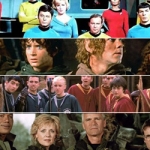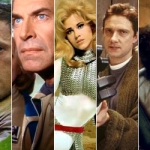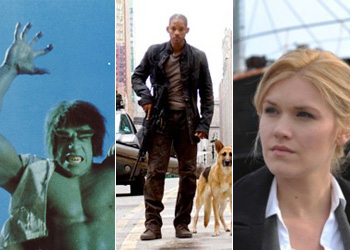
Sometimes, you make a movie or a TV series, and you base it on a comic book or novel or video game or self-help book or roleplaying game or urban myth or the lame lies your high school friend told you about the “girl” he met at band camp.
This is known as an “adaptation.” One school of thought is that, if you name the screen adaptation after the source material, you should try to have some kind of resemblance to the original. The other school of thought dictates making a movie or TV show about whatever the hell you feel like producing and titling it after something completely unrelated. Here are some examples to show you what I mean (some may include spoilers!):
Doing it right: Blade Runner

Let’s start with a movie that did it the right way. The title of the movie is different than the original novel. Plus (in the original release) there wasn’t much reference to Do Androids Dream of Electric Sheep?, which was the Philip K. Dick novel that inspired the movie.
So if people were nerdy about it, they would know going into the deal that it was a loose adaptation. But because the title was different, and because the movie studio didn’t push the Philip K. Dick connection, people didn’t expect too much. Good job, Hollywood.
Minority Report

Let’s stay on Dick a while. Philip K. Dick got the award for most adaptations of his short stories without earning a cent, which is why in Hollywood they say: you can never get too much Dick. Actually, I’m pretty sure that award doesn’t exist, but I’m pretty sure they do have that expression.
Anyway, they should invent that award so Dick can get it, because there’s a lot of Dick in Hollywood. In the case of Minority Report, they started out strong, but somewhere along the way (just after the opening credits) things went sideways.
In the original, the hero is a crusty old timer. He’s an out-of-shape balding curmudgeon in the twilight of his life who invented the precrime unit 30 years ago. In the movie, he’s a strapping physical specimen with an inadequately explored knack for parkour. In the story, the hero actually commits the murder. He was framed, but went ahead and committed the murder anyway.
In the movie, the murder the hero commits (the majority report) is some kind of cover-up and our hero does not turn out to do what the majority report thought he was going to do.
The Colorado Kid / Haven

They almost got it right, because they don’t actually call the screen version The Colorado Kid. Syfy has that much going for it. And the show is fun to watch. Plus, true Stephen King fans probably get a kick out of all the references to other Stephen King stories that the rest of us Stephen King amateurs don’t even notice. So, that’s the cool part.
But the problem is that Syfy keeps on talking about how the show is based on The Colorado Kid. Of course, it’s not based on that novel, which has no supernatural elements to it whatsoever. The original story is about a couple of old farts sitting around the balcony telling their bright eyed young intern how a mysterious corpse showed up in town twenty years ago and nobody knows how it got there. In Haven, which is supposedly based on The Colorado Kid (but was actually based on Eureka, Syfy’s other TV show about a quirky small town), you’ve got a super hot female FBI agent who visits a small town in New England, and you’ve got a bunch of inexplicable supernatural events. Then she teams up with the super hot town detective. So, that’s kind of weird. But the point is that it’s not based on The Colorado Kid.
The Incredible Hulk

The original comic told us the story of a guy named Bruce Banner who turns into a super strong indestructible raging monster that likes to smash. In the process of smashing – and this is the best part – the monster takes on super villains, the US army, evil aliens, and – to the delight of the more literary among us – explores the duality of man.
The TV show, on the other hand, tells the story of a guy named David Banner who turns into a super strong monster destined to end every episode by striking the “most muscular” bodybuilding pose while growling in slow motion. The most logical thing to do, according to the producers of this little gem, is to go on the road and right wrongs in various small towns. I liked the TV show a lot; don’t get me wrong about that. But did they have to call it The Incredible Hulk? And couldn’t they let him keep his original name? WTF?
Masters of the Universe
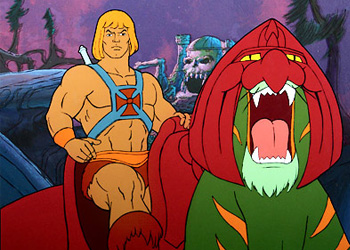
Most people think of the mid-’80s cartoon when they hear the words “He-Man.” As an after thought, they might think something like “Hey, they made a toy based on that cartoon, right?” But wrong! The toy came first, and each figure came with a mini comic book. In that mini comic book, He-Man was a jungle barbarian, setting out on a journey of adventure, stumbling across new friends who augment his strength with a battle ax, a giant green tiger, and other assorted items that were sold separately.
The cartoon adaptation ignored the barbarian origins, added an alter ego, and invented a power sword that gave He-Man his strength. I suppose they wanted to avoid getting sued by the Conan the Barbarian people (again).
Planet of the Apes
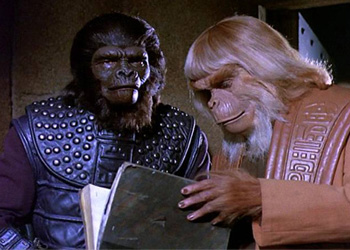
I am Lamar, which means I’ll slip in a little Planet of the Apes at the slightest provocation. And the theme of this post is the perfect chance, since the original book (written in French and titled La Planète des singes) and the original movie (starring Charlton Heston) have nothing in common. They both have talking apes. But besides that, nothing (except for some of the characters have the same names, and the whole thing about humans devolving while the apes evolve, and the idea of humans traveling through space and arriving on the ape planet) is the same.
Of course, the original book is French. Hollywood has a long tradition of adapting things that are European and pretending they were original Hollywood ideas. In that sense, POTA is like the Smurfs.
I Am Legend
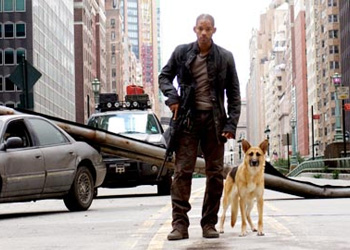
The hero of the original novella by Richard Matheson is a legend in the same way that Dracula is a legend. To date, no adaptation of this story has gotten that part right.
But let’s back up a second: on screen versions of this story demonstrate one thing: it’s tough to make a movie about just one dude going around being alone. It’s tough with a novella (or novel or short story) too, but it can be done, because you have the guy’s whole interior monologue to play with which means, for example, reading about a guy trying to open a can of beans is less boring than watching him do it.
For this reason, screen adaptations of I Am Legend can be somewhat forgiven for ignoring the central point of the source material, or the reason the guy calls himself a legend. The Charlton Heston version, called Omega Man, recognized this and didn’t used the same title. But Will Smith’s version didn’t recognize this and stepped straight into WTF land. In Smith’s version, he’s a legend because he’s the dude who found the cure to zombie-ism. So he’s a legend in the same way whoever cures cancer will be a legend.


